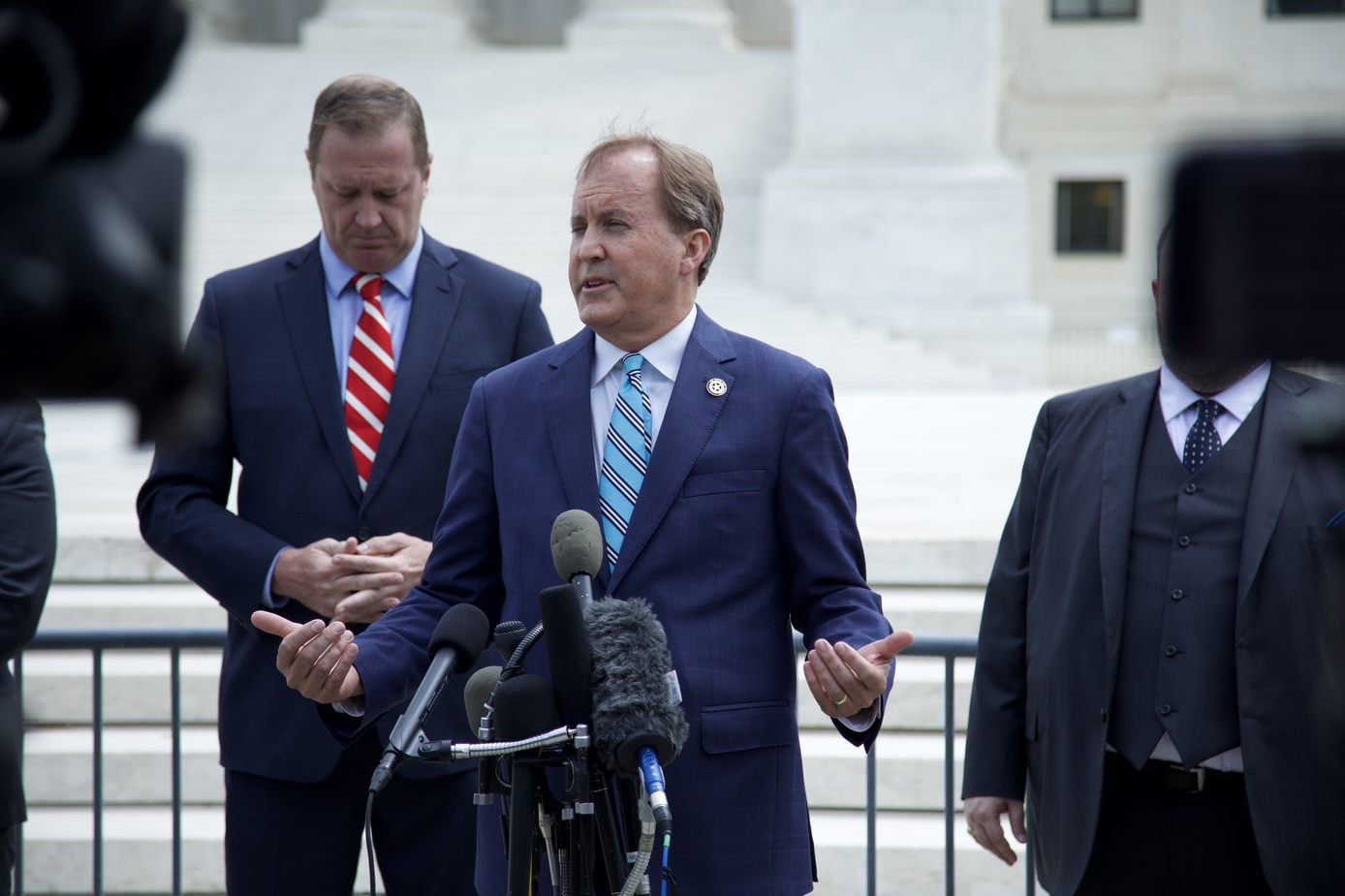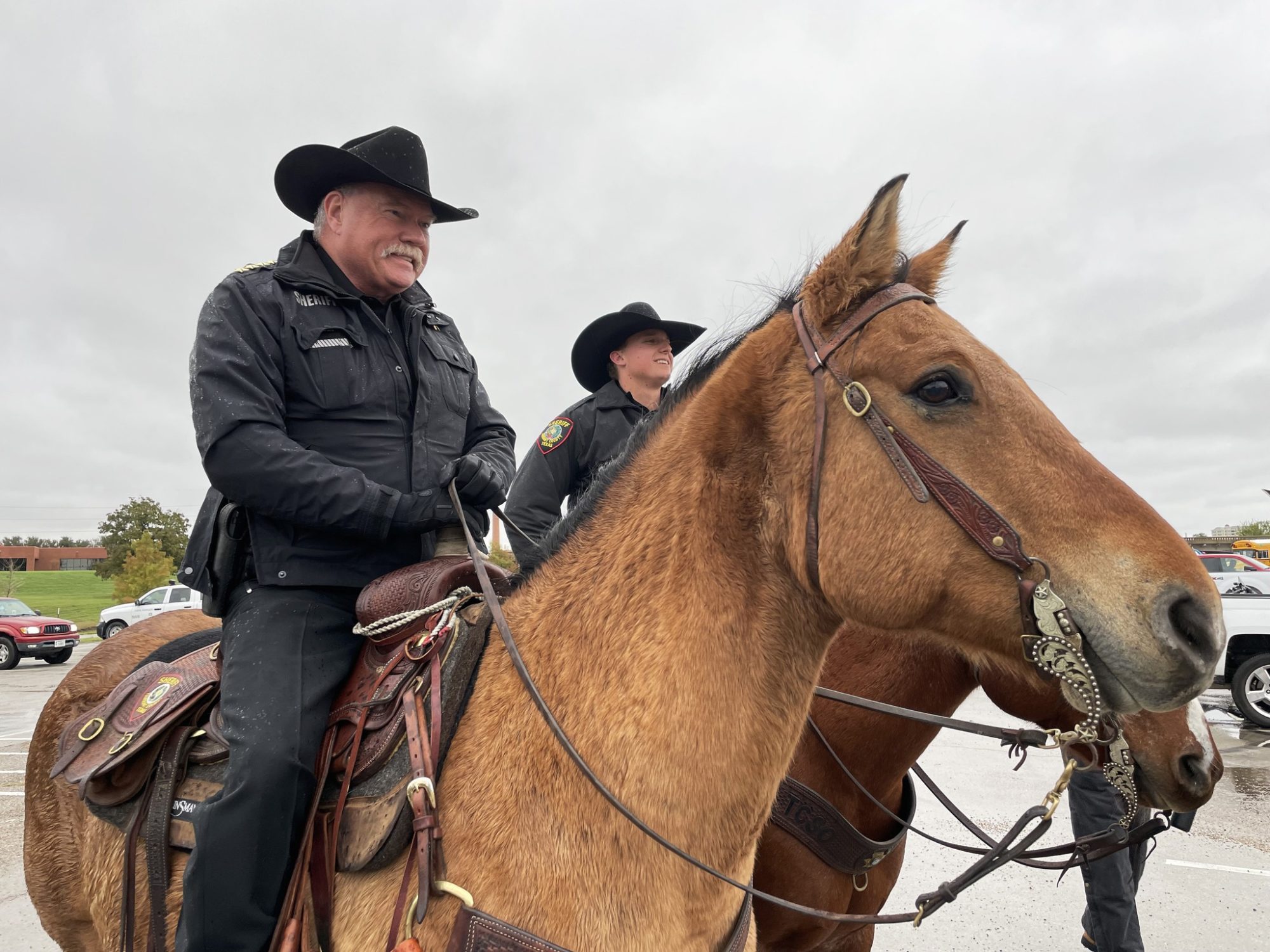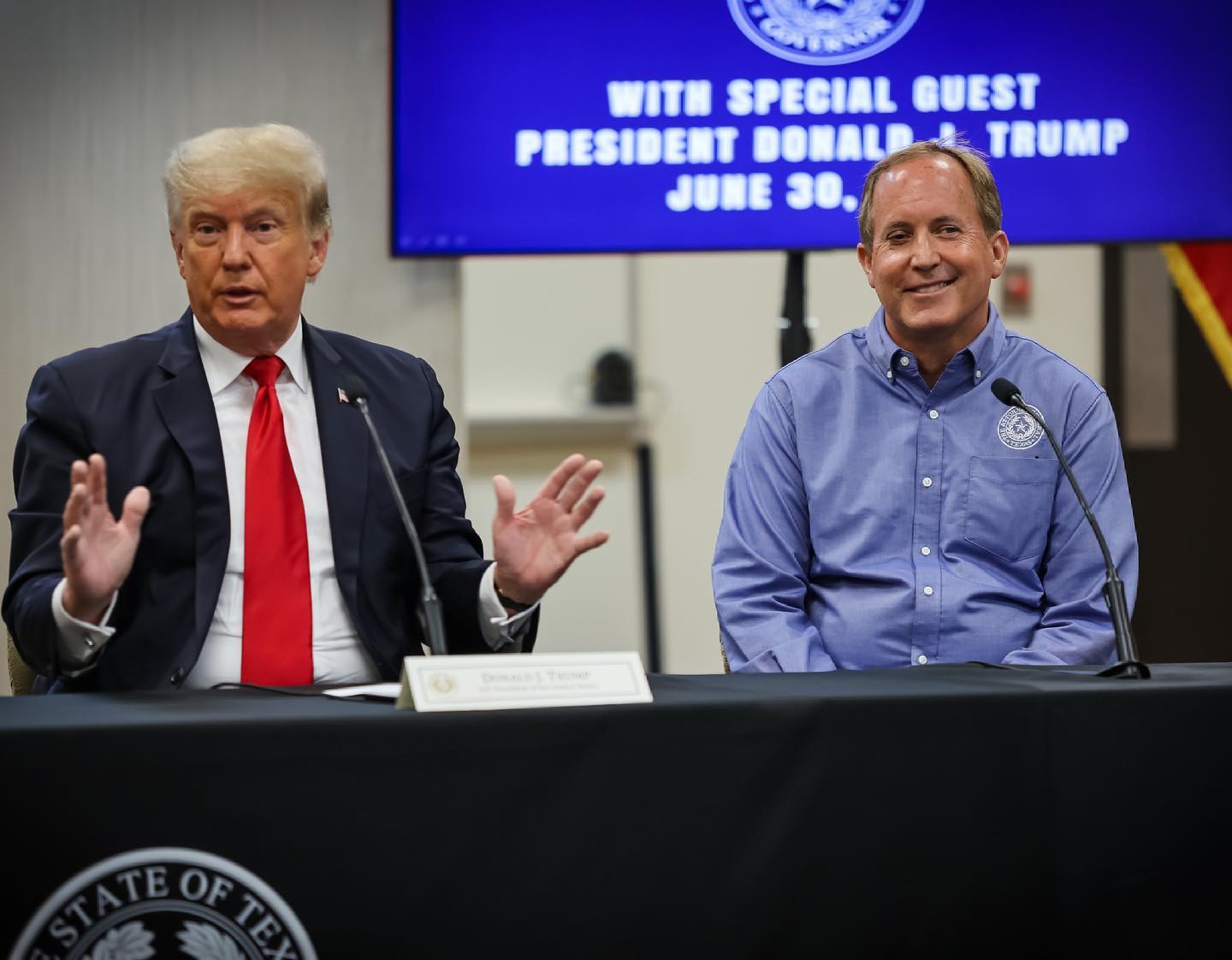The “Chief Lawbreaking Officer” of Texas Finally Faces Trial
Ken Paxton evaded scandal—criminal indictments, a staff revolt, a whistleblower lawsuit—for years. But his impeachment trial starts in the Texas Senate on Tuesday.
| September 1, 2023

At first, Mark Penley loved working in the Texas attorney general’s office. He had already considered Attorney General Ken Paxton a casual friend when he was recruited to run the office’s criminal division in October 2019, having met him years earlier when they worked at the same Dallas law firm. A lifelong Republican and devout Christian, Penley didn’t initially have much contact with Paxton but he assumed they shared the same values and beliefs in public service.
That all changed after just a couple months on the job, according to a transcript of Penley’s interview with investigators for the Texas House earlier this year. In December 2019, Paxton asked Penley to meet him at a Dallas Starbucks before walking his senior deputy out to his car for a conference call about a matter of personal importance to the attorney general. “This is a friend of mine, Nate Paul, and he’s had some issues with the FBI,” Paxton said as introduction after putting the call on speaker. “I want you to listen to his story and then let’s talk about it.”
Penley’s call with Paul, a Paxton donor and Austin investor with an imploding real estate empire, was one of many meetings where Paxton’s subordinates have said he pressed them to use the immense powers of his office to help with his friend’s legal woes. By Oct. 1, 2020, Penley and several other senior aides had blown the whistle and alerted law enforcement to say they believed that Paxton had broken laws by intervening in legal cases on Paul’s behalf. They claimed the attorney general had even gone so far as to help his friend orchestrate subpoenas targeting his foes—including banks that were in litigation against the real estate investor and law enforcement agents who were investigating him for financial crimes (Paul was ultimately indicted in federal court this past June).
Paxton fired most of the whistleblowers, including Penley, but some of them sued and earlier this year succeeded in forcing the AG to apologize and agree to a $3.3 million settlement—which Paxton then asked Texas lawmakers to pay for with state funds.
That bold request to settle his legal problems with taxpayer money triggered an investigation by lawmakers, which ultimately led to a landmark vote in the Texas House on the Saturday before Memorial Day of this year. That day, an overwhelming number of House members, including a majority of Republican members, voted to impeach one of the nation’s most powerful and prominent conservative politicians.
Paxton’s impeachment—the second ever of a statewide official in Texas—resulted in his suspension without pay and set up a trial in the Texas Senate, which is tasked with deciding whether to convict and permanently remove the attorney general.
The trial is scheduled to start on Sept. 5, in a chamber also controlled by the GOP, and at least some Republican senators would have to vote to convict him.
The impeachment has deepened a rift among Republicans who dominate Texas politics and often fight over how far to the right they should push the state, turning his trial into the latest battlefield for the factions jostling to control the party.
A leader of the state’s far-right, Paxton was a flag-bearer in 2020 of Donald Trump’s legal efforts to overturn the presidential results. He has ramped-up policing of elections, championed attacks on the families of trans youth, and refused to defend state agencies in lawsuits by his far-right supporters, including attacks on state campaign finance laws.
Far-right activists and lawmakers, whom Paxton has helped empower while in office, have been his most vocal supporters since the impeachment, which they have called a coup against the voters who elected him. Paxton and his lawyers have argued that his problems have been public and known for years to Texas voters, who still delivered him an overwhelming victory when he last ran for re-election last November.
But in recent weeks, the prominent Houston lawyers hired by the Texas House to prosecute the case against Paxton have published thousands of pages of documents and interview transcripts that bolster the allegations and hint at how difficult the upcoming Senate trial, which is expected to stretch on for weeks, could be for Paxton. Those documents also allege that Paxton went to great lengths to hide his relationship with Paul by using a burner phone, a secret email account and even a fake name on his Uber account.
The investigation has also resurfaced news of Paxton’s extramarital affair; after he turned his office into what the House impeachment managers have called a “concierge law firm” for Paul, Paxton’s friend allegedly returned the favor by giving the attorney general’s mistress a job in Austin so she could move closer to him, as well as remodeling Paxton’s Austin home. And it has dragged many of Paxton’s other long standing legal problems back into the spotlight, including criminal fraud indictments that have loomed over him for almost as long as he’s been attorney general.
Paxton’s impeachment may mean his luck has finally run out, but as recently as March, Penley worried the scandals surrounding his former boss and his firing of whistleblowers hadn’t made a dent on public opinion. When he sat down with House investigators, Penley voiced frustration that none of the people Paxton had hired to replace his executive crew seemed troubled by what all had happened.
“It’s a complicated story,” Penley told investigators, “but if you understand what was going on, this was outrageous conduct by an attorney general that’s supposed to be the chief law enforcement officer for the state of Texas, not the chief lawbreaking officer.”
Serious allegations from within Paxton’s own party looked like they could tank his career as Texas Attorney General before it even took off.
During his first run for AG in 2014, Paxton, who was then a state Senator, faced a bruising GOP primary, with fellow Republicans accusing him of using his influence to pad his pockets. One prominent attack ad that primary season highlighted a lawsuit from a Dallas couple accusing Paxton of failing to disclose kickbacks he got for steering them into what turned out to be a doomed real estate scheme with an investor buddy of Paxton’s.
Paxton’s legal problems intensified later that year after the Texas Tribune reported that he hadn’t been registered with the state when finding investors for his friend, a violation of a law meant to protect people against fraud; as a state representative, Paxton in 2003 had himself even voted for a bill that made such conduct a felony in Texas. Paxton called the lapse a mistake, signed a reprimand with the state securities board agreeing to pay a fine and waive his right to appeal, and went on to win the attorney general election in November 2014.
Then in August 2015, a grand jury in Collin County, where Paxton lives north of Dallas, indicted him on multiple charges of defrauding investors and for failing to register with state securities regulators. His defense strategy almost immediately raised red flags for funding his top-dollar defense team with money raised from political donors, including a $100,000 “gift” from a CEO whose company was under government investigation, including by Paxton’s office.
After outside lawyers were called in to prosecute Paxton (the local district attorney, a college friend and occasional business partner, was pressured to recuse himself), his far-right supporters inside and outside of government conspired to defund his prosecution. After one of Paxton’s rich supporters sued to block the county’s payments to the outside lawyers tapped to prosecute the AG, other right-wing activists began attending county commission meetings to accuse local officials of funding a “witch hunt.” Commissioners eventually agreed to block payments to the special prosecutors, who haven’t been paid for their work on the case since 2016.
That strategy has helped stall any potential courtroom reckoning over the criminal charges for more than eight years. Even with the indictments, Paxton faced little opposition; Justin Nelson, a Houston attorney and Democrat who ran against him in 2018, was the only major party candidate who even challenged the AG that year. Nelson lost by less than four points despite running on a shoestring budget.
“Paxton’s whole strategy was not to bring attention to himself or to the charges against him,” Nelson recalled. “That was explicit, in both turning down interviews and not wanting to talk about it, and also downplaying the closeness of the race, which turned out to be very close.”
Since that election, Paxton has hewed even harder to the far right wing of his party, achieving hero status among the MAGA base after helping lead the legal efforts to overturn Trump’s loss in the 2020 election. After Paxton’s lawsuit seeking to overturn election results in four key battleground states was summarily rejected by the U.S. Supreme Court, the attorney general also appeared with his wife at a pro-Trump rally in Washington D.C. on Jan. 6, 2021. “We will not quit fighting,” he told the crowd, pumping them up with more false claims of voter fraud before people stormed the U.S. Capitol.
Being the most MAGA was enough for Paxton to clinch Trump’s endorsement in 2022 and clear what had initially looked like a potentially daunting Republican primary field for the AG race, which included a right-wing congressman, a state supreme court justice, and the last scion of the Bush political dynasty. They all pointed to the criminal indictments and whistleblower allegations against Paxton, but the incumbent whalloped the field, prevailing 68 to 32 percent against George P. Bush in the primary runoff. In November, he beat his Democratic opponent, civil rights attorney Rochelle Garza, by more than 10 points.
After his 2018 loss to Paxton, Nelson went on to help represent Dominion Voting Systems in its defamation lawsuit against Fox News over the lies it broadcast about the 2020 election, helping negotiate a settlement ordering the right-wing news network to pay the company nearly $800 million. Nelson, who said he can’t comment on the Dominion matter, has continued to follow the developments around Paxton’s legal drama since running against him.
“Paxon has recognized that his corruption and indictments are a real problem for him, and he made the considered political choice to embrace Trump over everything else,” Nelson said. “I think he both literally and figuratively saw embracing Trump as his get out of jail free card that would allow him to basically be inoculated from any of these charges by saying, ‘Well, look I got the Trump base behind me.’”
Nelson pointed to an Associated Press report in late 2020 showing Paxton had quietly acknowledged his affair to senior staffers ahead of the 2018 election but told them it had ended, an apparent effort to keep it from coming out before a tight election. He also cited records and testimony from whistleblowers recently published by House impeachment managers that allege the affair continued.
“We know now, based on what has come out in these impeachment proceedings, the affair not only continued it became the reason why he was doing favors for Nate Paul, according to the evidence that’s been out there,” Nelson said. “It really has been a concerted strategy of Paxton to not have the facts come out in public.”
Paxton has developed a symbiotic kind of relationship with his supporters since they paved his rise to statewide office in Texas. The far-right conservative base has helped Paxton weather his mounting scandals and legal problems, and the attorney general has helped push their key policy priorities, from anti-LGBTQ laws to school vouchers.
Millie Black, a political science professor who teaches at Collin College in Paxton’s home turf of the north Dallas suburbs, said his impeachment is testing the far-right’s influence on the GOP politics that dominate state government in Texas—what she calls a “triangulation of religion, politics and the law.”
“When it comes to the Republican Party and these ultra conservative, socially conservative, evangelical principles, these things do not happen overnight, these things are systematically developed,” Black said.
There are already signs that Paxton’s impeachment has chipped away at support among his base and could end up being a turning point regardless of what the Senate does. State Representative Jeff Leach, a Collin County Republican who once helped defund the prosecution and derail the criminal case against Paxton, was one of several House Republicans from Paxton’s hometown who voted to impeach him in May. Text messages obtained by the Dallas Morning News showed Leach fuming after the attorney general asked lawmakers to pay for his settlement with whistleblowers.
“I don’t think y’all understand how pissed members are, including many of your conservative friends in the house and senate,” Leach texted a senior advisor for Paxton. “I don’t know a single legislator who believes taxpayers should be expected to be on the hook for this.” (Leach didn’t respond to questions for this story.)

Paxton still has many diehard supporters who have vowed to go after Republican lawmakers who supported impeachment in the next GOP primary. To defend Paxton, they have also pushed an alternate version of reality in which the Texas House, despite being run by a Republican majority and regularly churning out red-meat legislation, is actually run by Democrats.
Some members of the Texas House even said that Paxton personally called them on the floor ahead of his impeachment to bully them out of voting yes. “I would like to point out that several members of this House, while on the floor of this House doing the state’s business, received telephone calls from General Paxton threatening them with political consequences in their next election,” state Representative Charlie Geren, a Republican who helped lay out the impeachment case ahead of the House vote, said during the proceedings.
Now Paxton’s supporters have been similarly leaning on Texas senators, who will act as jurors. Removing him requires a two-thirds vote among the 31 members of the Texas Senate, so even assuming all 12 Democrats vote to impeach, they would still need to bring at least nine of 18 Republican senators on board. A 19th Republican senator, Angela Paxton, is Paxton’s wife and won’t be allowed to cast a vote under rules the Senate adopted before trial.
Senators this week declined to take up a motion to dismiss the articles of impeachment against him, signaling that most of them are at the very least willing to let the trial play out.
The documents and interviews published by the House leading up to the trial have added to the fire, showing an attorney general who had become increasingly brazen, defiant of pushback even from top advisors, and conspiratorial about other law enforcement because of his own legal problems.
Penley, the whistleblower who had been recruited to run the AG’s criminal division in 2019, told House investigators that Paxton remained fixated on the legal drama surrounding Nate Paul, even after his top staffers pleaded with him to stop intervening in legal matters on behalf of his friend and warned that he could be risking bribery charges. According to testimony from Penley and other top staffers, Paxton still kept pushing his deputies to meet and discuss Paul’s allegations—including wild claims that federal agents had doctored search warrants to target the real estate investor, which Paxton’s staff had already determined to be baseless.
In September 2020, Paxton again asked Penley to meet to discuss his friend’s legal problems, this time on a Saturday afternoon at a Dunkin Donuts in north Dallas. Penley told House investigators he woke up before dawn that morning, which he took as a sign from the divine.
“I’m a Christian, and I believe God woke me up and what I felt an urgent need to do was sit down and think about what I was going to say to the attorney general,” Penley said, explaining he wrote down several pages of notes, which he studied before the meeting but didn’t bring with him; he didn’t want Paxton to feel like he was interrogating or cross-examining him.
“I was trying to make any appeal to him, you know, ‘I’m trying to be your friend, I’m trying to be loyal to you, I’m trying to keep you out of trouble,’” Penley recalled telling Paxton, urging him to drop his friend’s case. Penley said that Paxton seemed frustrated, at one point leaning back in his chair and throwing up his hands, asking his criminal division chief, “So you won’t help me?”
After pressing Paxton and asking why he cared so much, Penley said the attorney general told him, “You don’t understand how I feel. I have been the victim of an unjust prosecution.”
Sign up and stay up-to-date
Support us
Bolts is a non-profit newsroom that relies on donations, and it takes resources to produce this work. If you appreciate our value, become a monthly donor or make a contribution.




